Reading a Record Collector 2
At Gabriel’s Books in Lakeside, the same person who left behind the record collection discussed here also, I think, left behind the record collection discussed below. Who was this person, what kind of person were they?
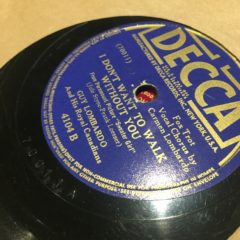
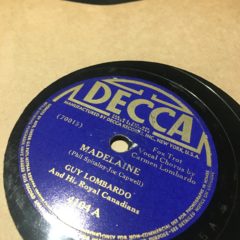
Guy Lombardo and his Royal Canadians are believed “to have sold between 100 and 300 million records during their lifetime.” For comparison, Taylor Swift is estimated to have sold about 115 million to date, I think — the Royal Canadians were a phenomenon.
And, the Lombardos were characters. According to Wikipedia, Gaetano Alberto “Guy” Lombardo (1902–1977) was a Canadian-American bandleader, violinist, and hydroplane racer.”
“I Don’t Want to Walk without You” is a track from a movie called Sweater Girl, but it became popular enough, it appeared in a Popeye cartoon as well. The cartoon is linked below, as well as two recordings of the songs on this album.
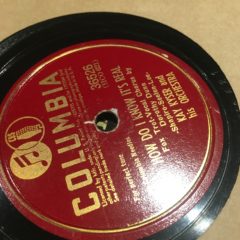
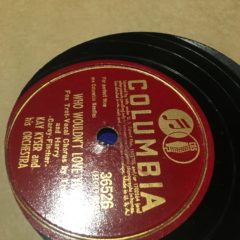
According to Wikipedia, “James Kern Kyser (June 18, 1905 – July 23, 1985), known as Kay Kyser, was an American bandleader and radio personality of the 1930s and 1940s.” As host of a radio quiz show, he was known as “The Ol’ Perfessor.”
Kay Kyser is parodied (and appears as voice talent) in the Porky Pig cartoon “Africa Squeaks,” which I cannot link to here, because of the stereotypes it manifests.
But between Kyser and Lombardo, I remember how much these old cartoons were part of a matrix of popular culture.
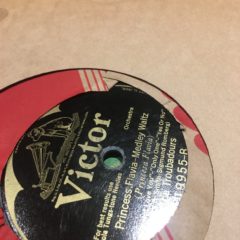
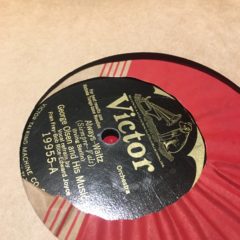
All I can find about George Olsen is a statement of his popularity: “George Olsen and his Music were prolific Victor recording artists and their records are among the most numerous found by record collectors today, testifying to their original popularity.”
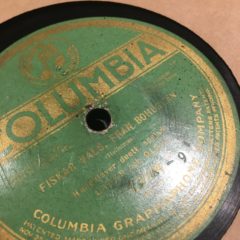
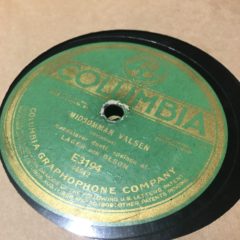
“Midsommar Valsen” — now this is the Northern Minnesota relic I have been looking for — some Scandinavia on a disc. In this case, the tunes are Swedish.
According to YouTube, “John Lager and Eric Olsen recorded David Hellström’s Waltz “Midsommar Valsen” as an accordion duet in January 1917 at Columbia Studio in New York.”
According to Discogs, John Erik Lager was a “Swedish-American accordionist (born July 16, 1890 in Norrköping, Sweden – died December 24, 1962 in Brooklyn, NY).” His collaborator, Eric Olsen was born “Eric William Olzen,” also spelled “Erik Olsson,” a “Swedish-American accordion player (born June 18, 1895 in Österåker, Södermanland, Sweden – died February 17, 1984 in Palm Beach, Florida, USA).” Discogs continues: “Born, the son of professional violinist Per Olsson, Olson studied the violin and piano from age 6. When he was 12, he received accordion lessons from the former accordion champion of Sweden, David Hellström. At age 13, Olsen performed professionally all over Europe. In 1912, the seventeen-year-old Olson immigrated to the United States, where he settled in Brooklyn. In 1920, he and his wife Eva shared an apartment with fellow Swedish accordionist John Lager, with whom he also recorded…. Olson recorded over 200 records, mostly for Columbia. In 1926, he founded an accordion school in Brooklyn and taught there for many years.”
This record, then, was Olson and Lager’s recording of a track by Olson’s teacher, which is charming. The song is described as “comic” but I can’t find a summary of lyrics — does anyone know enough Swedish to help me out?
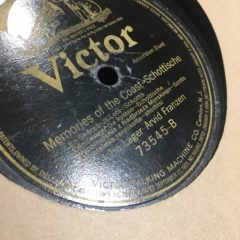
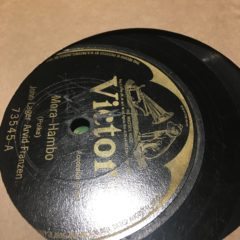
More “ethnic” (accordion) music, about which information can be found here. Music by these performers can be heard here.
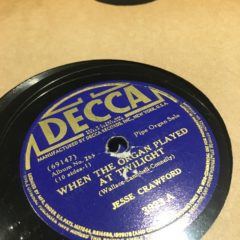

Jesse Crawford was an organist, first to accompany silent movies, then as a musical performer. I can find a cover of “Perfect Song” by Guy Lombardo, but not this version. “When the Organ Played at Twilight” can be found here.
Bing freaking Crosby. I’m not sure that there is much to be said about Bing.
Wikipedia does the initial frame for us:
Harry Lillis “Bing” Crosby Jr. (1903 – 1977) was an American singer and actor. The first multimedia star, he was one of the most popular and influential musical artists of the 20th century worldwide. He was a leader in record sales, radio ratings, and motion picture grosses from 1930 to 1954. He made over 70 feature films and recorded more than 1,600 songs.
In 1948, American polls declared him the “most admired man alive”, ahead of Jackie Robinson and Pope Pius XII. In 1948, Music Digest estimated that his recordings filled more than half of the 80,000 weekly hours allocated to recorded radio music.
It’s impossible to over-estimate the impact Bing Crosby had on the technology, the professional practice, and the shape of radio and movies and even television. In the content he broadcast, too, he had immense influence on American ideas, values.
He was also a jerk with, at different points, problems with gambling, drinking, marital infidelity, and, he was, as his children described him, “cruel, cold, remote, and physically and psychologically abusive” (Wikipedia).
But I want to forget that, for a second, and so I’ll add a Looney Tunes of Crosby first.
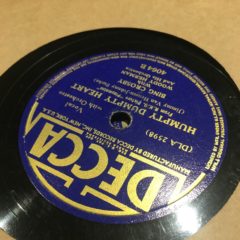
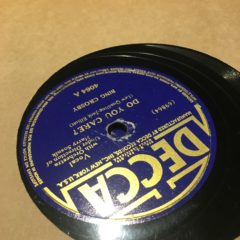

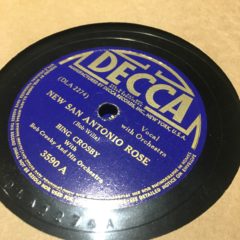

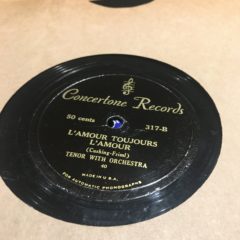
According to Wikipedia,
“Oh Promise Me” is a song with music by Reginald De Koven and lyrics by Clement Scott. The song was written in 1887 and first published in 1889 by G. Schirmer, Inc. De Koven may have based the melody partly on a song composed by Stanislao Gastaldon, “Musica Proibita”.
In 1890, De Koven wrote his most successful comic opera, Robin Hood. After opening night, the contralto playing Alan-a-Dale, Jessie Bartlett Davis, demanded a song to better show off her voice, threatening to walk out of the production. De Koven inserted “Oh Promise Me” into the score for her.[1][2]
This song, then, was absolutely old fashioned by the time it was recorded on heavy shellac (the antecedent to vinyl).
The B-Side, “Love Everlasting (L’amour, toujours, l’amour)” was written by Rudolf Friml, Catherine Chisholm Cushing. Cushing was impossibly productive for a woman at the time, for anyone at the time. According to Wikipedia,
Her first show, The Real Thing (1911), was a comedy that ran for sixty performances and starred Henrietta Crosman and Minnie Dupree.[4] This was followed by her Widow by Proxy (1913) with May Irwin, Kitty MacKay (1914), Sari (1914, book by Cushing and Eugene Percy Heath), Jerry (1914) starring Billie Burke, Pollyanna (1916, based on the book by Eleanor H. Porter), Glorianna (1918-1919, a musical based on Cushing’s own Widow by Proxy), Lassie (1920, a musical version of Kitty MacKay), Marjolaine (1922), Topsy and Eva (1924-1925, a burlesque based loosely on Uncle Tom’s Cabin), Edgar Allan Poe (1925), and The Master of the Inn (1925-1926, based on a book by Robert Herrick).
Film adaptations of plays or stories by Cushing include Kitty MacKay (1917), Widow by Proxy (1919) starring Marguerite Clark,[16] Pollyanna (1920) starring Mary Pickford, Don’t Call Me Little Girl (1921) starring Mary Miles Minter, Topsy and Eva (1927) starring Rosetta Duncan and Vivian Duncan, and The Prince and the Pauper (1937, based on the book by Mark Twain).
Songs by Cushing included “L’amour, toujours, l’amour” (1922, music by Rudolf Friml), which was on several film soundtracks, and “”Love’s Own Sweet Song (Sari Waltz)” (1947).
Her Topsy and Eva was among the first American musicals adapted for early television; a one-hour version aired in July 1939.
These discs were not sold in the way the Crosby ones were — they seem designed to show off the song, not the performance. Perhaps to accompany home performance?
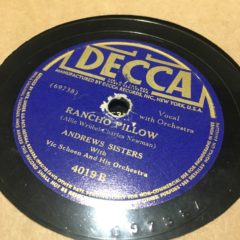
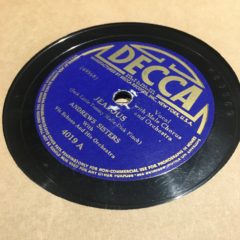
“Rancho Pillow” and “Jealous” by the Andrews Sisters — just for parallel, I’ll note that the Andrews sisters were parodied here.
So, this folio, this binder, this collection of records — Is this what a young person would have listened to, in Duluth, in the 1940s? Perhaps the pop hits pushed over the airwaves and some locally popular Swedish tunes, handed down from their parents along with some accordion tunes?
(To reiterate a theme from earlier posts — I love recovering the diversity of entertainment, the diversity of life, in our region, 80 years ago, in these records.)
And what to do with the role of cartoons in making pop music into a phenomenon?
What do you think?
Recommended Links:
Leave a Comment
Only registered members can post a comment , Login / Register Here





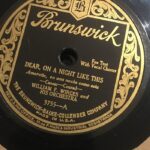








1 Comment
Helmut Flaag
about 3 years ago